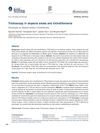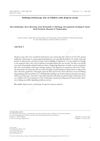 December 2023 in “Portuguese journal of dermatology and venereology”
December 2023 in “Portuguese journal of dermatology and venereology” Trichoscopy can reliably distinguish between alopecia areata and trichotillomania.
 December 2023 in “Dermatology and therapy”
December 2023 in “Dermatology and therapy” Japanese patients and physicians often disagree on the severity of Alopecia Areata and treatment satisfaction, needing better communication and treatments.
[object Object]  December 2023 in “EPRA international journal of multidisciplinary research”
December 2023 in “EPRA international journal of multidisciplinary research” Alopecia areata causes sudden hair loss, has genetic links, and can be managed but not cured.
 December 2023 in “Curēus”
December 2023 in “Curēus” COVID-19 vaccination does not significantly increase the risk of developing alopecia areata.

Alopecia areata patients have higher levels of certain immune receptors, suggesting new treatment possibilities.
 November 2023 in “Laser therapy”
November 2023 in “Laser therapy” Trichoscopy is essential for diagnosing and managing alopecia areata in children.
 October 2023 in “Dermatology practical & conceptual”
October 2023 in “Dermatology practical & conceptual” Pulse corticosteroids help regrow hair in alopecia areata but have side effects, especially betamethasone.
 October 2023 in “Benha Journal of Applied Sciences”
October 2023 in “Benha Journal of Applied Sciences” Methotrexate and vitamin D3 are potentially more effective and safer than triamcinolone for treating localized alopecia areata.
 October 2023 in “Benha Journal of Applied Sciences”
October 2023 in “Benha Journal of Applied Sciences” PPAR-γ may be a key target for treating alopecia areata and other skin conditions.
 October 2023 in “Research Square (Research Square)”
October 2023 in “Research Square (Research Square)” Oxidative stress is linked to mild patchy alopecia areata.
 September 2023 in “Dermatology and therapy”
September 2023 in “Dermatology and therapy” Ritlecitinib effectively improves hair growth in alopecia areata patients, regardless of hair loss pattern.
 August 2023 in “Research Square (Research Square)”
August 2023 in “Research Square (Research Square)” Melanocytes may trigger the immune response in alopecia areata, affecting hair regrowth.
 August 2023 in “International journal of research in dermatology”
August 2023 in “International journal of research in dermatology” Janus kinase inhibitors are effective and generally safe for treating hair loss in adults with alopecia areata.
 August 2023 in “Sabuncuoglu Serefeddin Health Sciences”
August 2023 in “Sabuncuoglu Serefeddin Health Sciences” CT60 polymorphism might increase the risk of Alopecia Areata.
 July 2023 in “Research Square (Research Square)”
July 2023 in “Research Square (Research Square)” Certain gut bacteria may protect against alopecia areata, while others may increase the risk.
 July 2023 in “Journal of lasers in medical sciences”
July 2023 in “Journal of lasers in medical sciences” Red laser therapy helped regrow hair in an alopecia areata patient within 21 days.
 June 2023 in “Dermatology and therapy”
June 2023 in “Dermatology and therapy” Doctors in the Middle East need better treatments and more knowledge about new therapies for hair loss condition Alopecia Areata.
 June 2023 in “Dermatology and therapy”
June 2023 in “Dermatology and therapy” The Middle East and Africa need better data, treatment consensus, and support for Alopecia Areata.

Non-invasive methods can effectively diagnose and manage alopecia areata.
[object Object]  June 2023 in “Medeniyet medical journal”
June 2023 in “Medeniyet medical journal” People with alopecia areata have similar retinal structures but thicker choroidal regions compared to those without the condition.
 April 2023 in “Medizinische Genetik”
April 2023 in “Medizinische Genetik” New research has found 14 genes linked to the risk of developing alopecia areata, improving understanding and treatment options.
 January 2023 in “International Journal of Zoological Investigations”
January 2023 in “International Journal of Zoological Investigations” Certain genetic variations in IL-16 may increase the risk of alopecia areata.
 December 2022 in “Medical lasers”
December 2022 in “Medical lasers” Low-level laser therapy may help with hair regrowth in alopecia areata but its effectiveness for psoriasis and atopic dermatitis needs more research.
 December 2022 in “Rossijskij žurnal kožnyh i veneričeskih boleznej”
December 2022 in “Rossijskij žurnal kožnyh i veneričeskih boleznej” New treatments for child hair loss due to immune issues are effective but not yet officially approved.
 November 2022 in “SAS journal of medicine”
November 2022 in “SAS journal of medicine” There's no link between low iron levels and the hair loss condition, alopecia areata.
 November 2022 in “Journal of Education, Health and Sport”
November 2022 in “Journal of Education, Health and Sport” The skin's bacteria might influence the development of a hair loss condition called alopecia areata.
 October 2022 in “Journal for Research in Applied Sciences and Biotechnology”
October 2022 in “Journal for Research in Applied Sciences and Biotechnology” Certain changes in the SHBG gene may increase the risk of PCOS in Iraqi women.
 August 2022 in “Acta dermato-venereologica”
August 2022 in “Acta dermato-venereologica” Propylthiouracil can cause hair loss, reduced sweating, and nail issues, but stopping the drug can reverse hair and nail problems.
 August 2022 in “International Journal of Health Sciences (IJHS) (En línea)”
August 2022 in “International Journal of Health Sciences (IJHS) (En línea)” Oxidative stress is important in causing alopecia areata.

Combining epinephrine with a steroid may help regrow hair in severe alopecia areata cases.






























